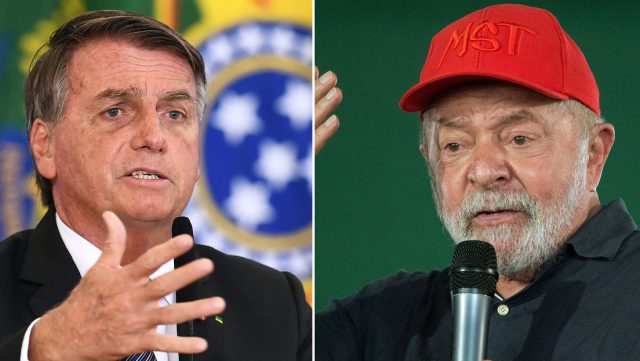After the first round of elections in Brazil, the team of leftist Luiz Inácio Lula da Silva and President Jair Bolsonaro are frantically mobilizing to get the largest number of supporters for the second round of the elections on October 30.
The difference between Lula, 76, who won with 48.43% of the vote, and Bolsonaro, 67, who obtained 43.20%, was 6.18 million votes.
More than 38 million people voted blank, null or did not vote. Lula and Bolsonaro will try to put them in their respective courts to win in the most polarized elections in the country’s history.
Another of their objectives will be the almost 10 million voters who voted for other candidates, explains journalist Marta Miera for RT.
So far, 14 of the 32 political parties have declared their support for Lula, from the Workers’ Party (Partido de los Trabajadores -PT-), and four for Bolsonaro, from the Liberal Party (Partido Liberal -PL -).
Although the picture seems favorable to Lula, the truth is that the four formations that support the far-right have a greater number of deputies and are part of the nucleus of the ‘centrao’, an influential group of conservative parties in Congress.
Another 14 political parties have not yet defined themselves or have declared themselves neutral.Cardoso supports Lula for the Presidency of Brazil
The center-right senator Simone Tebet and the center-left Ciro Gomes, third and four, respectively, in the first round and who together account for 7.2% of the votes, which means 8.5 million people, declared their support for Lula .
«I regret that the Brazilian democracy has been reduced to such an extent that Brazilians are left with two options, in my opinion, unsatisfactory», commented Gomes shortly after the announcement of his political formation, the Partido Demócrata Trabalhista (PDT). Gomes did not even mention the name of Lula, of whom he has been a harsh critic in recent years. In the opinion of analysts, his position does not help much.
For his part, Tebet said: «I will cast my vote for him [Lula] because I recognize his commitment to democracy and the Constitution, I do not know about the current president’s commitment».
Other outstanding support for Lula has been that of Senator José Serra (PSDB) or former President Fernando Henrique Cardoso (1995-2003), a historic leader of the Brazilian Social Democracy Party (PSDB).Governors support Bolsonaro
Meanwhile, the current president sealed important agreements with the governors of the three most populous states: in Sao Paulo with Rodrigo Garcia – who is already out of the dispute – and in Minas Gerais and Rio de Janeiro with Romeu Zema and Cláudio Castro, respectively. Both Zema and Castro were re-elected in the first round.
«Now that Brazil needs to advance, I believe much more in President Bolsonaro’s proposal than in that of the adversary», assured the governor of Minas Gerais, a key state in the elections and which has the second largest electoral college, only behind Sao Paulo. .
Since the redemocratization of the country, all the candidates who won the elections have won in Minas Gerais.
The president also received the support of his loyal ally, Governor Ibaneis Rocha (MDB), from the Federal District, and Ratinho Junior, from the state of Paraná.
In addition, the former judge and senator-elect Sergio Moro (Brazil Union) is also in favor of him. «Against the governmental project of the Workers’ Party, I declared my support for Bolsonaro in the second round», announced Moro, who as a magistrate, imprisoned Lula in the framework of Operation Lava Jato.
The former judge was Minister of Justice under Bolsonaro, but he resigned after accusing the president of alleged interference in the Federal Police.
The first survey released after the election day of October 2 attributes Lula with 51% voting intention and Bolsonaro with 43%, a narrower victory than was projected several weeks ago.
In the first round, the polls were right with the leftist, but they were wrong with the far-right, who was given 36% and got 43.20%, compared to 48.43% achieved by his opponent.


